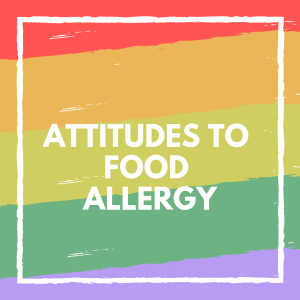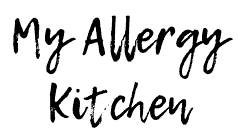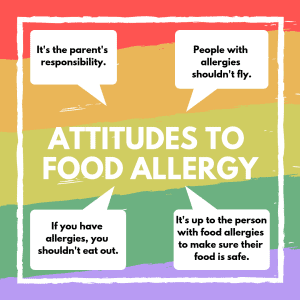Food allergies are increasingly common. Around 2 million people in the UK live with a diagnosed food allergy, and the majority of these are children. Food allergies cannot be cured, and the only way to manage them is to strictly avoid the food. Medication such as epinephrine injections or antihistamines can be given if a reaction does happen, but these don't always work, and don't work for all types of food allergy. Reactions can range from mild to life-threatening. But people's attitudes to food allergy can vary. Some people are considerate and understanding, and willing to make adaptations. Others seem to think it is not their problem, and they shouldn't have to deal with it.

Negative Attitudes
Food allergies have received a lot of coverage in the press lately, such as the high-profile case of Natasha Ednan-Laperouse, who tragically lost her life after eating a baguette from Pret-a-Manger. 9-year-old Sadie Bristow died of an anaphylactic reaction whilst on a family day out. Love Island star Jack Fowler has spoken about his severe allergy to nuts. I've also had a brush with the local press myself as I tried to raise awareness of the Teal Pumpkin Project for Hallowe'en. I risked reading the comments on some of these articles and I was shocked how negative some people's attitudes towards food allergy can be.
Comments such as:
- people with food allergies shouldn't fly on planes
- children with food allergies shouldn't go trick or treating
- if a child has food allergies, it's the parent's responsibility
- people with food allergies shouldn't eat out
- the onus is on people with food allergies to check for the presence of allergens
- why would you risk eating out if you have food allergies?
Let's Flip It
Imagine if we now changed this from people with food allergies to... people in wheelchairs. Does it still seem acceptable?
- people in wheelchairs shouldn't fly on planes
- children in wheelchairs shouldn't go trick or treating
- if a child is in a wheelchair, it's the parent's responsibility
- people in wheelchairs shouldn't eat out
- the onus is on people with wheelchairs to sort out their own needs
- why would you bother going out if you're in a wheelchair?
Shocking, isn't it? Thankfully, this is not how we really think about people in wheelchairs nowadays. We have disabled parking schemes. Disabled people have the legal right to access everyday services such as shops and pubs. Schools must make accommodations for disabled pupils. Charities fund mobility aids, support groups and activities, and even days out and holidays for families with a disabled child.
Quality of Life
And yet some people still have these negative attitudes towards food allergies, even though it is also a medical condition. Managing food allergies places a huge burden on people. Food is everywhere, and we need to eat three meals a day plus snacks, so there's no escape! This reduces quality of life, especially for those with severe or multiple allergies:
- mentally - having to plan and prepare all food carefully
- emotionally - the anxiety around accidental exposure and need for constant vigilance
- socially - having to ask awkward questions of people, being left out, food allergy bullying
- practically - having to spend more time preparing meals and shopping for food
- financially - free from food costs more
Food Allergies: The Reality
Can you imagine if you were never able to eat in a restaurant, cafe or pub? Yes, it is possible to eat at home, and people with food allergies do this most of the time. But the point of eating out in a restaurant isn't always simply to feed your body. Sometimes, we go out for a meal with friends or family to socialise or celebrate a special occasion.
Can you imagine if you were never able to grab a quick sandwich on the run? Yes, it is possible to prepare food at home and bring it with you, and people with food allergies do this most of the time. But what about the times when your train or plane is delayed for hours? Or there is a crash on the motorway and you can't get home? Or if you are taken ill and end up in hospital? You can't plan and prepare for every eventuality in life.
Can you imagine if you could never buy a takeaway? Yes it is possible to cook food at home, and people with food allergies do this most of the time. But what about the times when your kitchen is out of action? What if you are affected by flood or fire? Moving house? Power cut? What about if you are sick and not well enough to cook for your family?
Life Happens
Even with military style planning, things don't always turn out how you expect. People with food allergy sufferers need the option of buying food out-and-about, and this means relying on other people to give clear information on ingredients and prepare food safely. Even if this wasn't the case, can we really expect 2 million people (in the UK alone!) to only eat food prepared at home?
Let me remind you that most food allergy suffers are children. While the child is at home, it certainly is the parent's responsibility to keep them safe. But what about when they are at preschool or school? Or a children's birthday party? Or a playdate? Who is responsible then? After a certain age, the parent simply cannot monitor their child 100% of the time. We must rely on other people to keep our children safe. How can a child have a full childhood if other people aren't willing to do this?
Consideration For Others
As a society, we accept that people with disabilities have a medical condition and need extra support. I would like to see the same attitude towards people with food allergies. We members of the food allergy community need to raise awareness and understanding of what it is like to live with food allergies. I hope that with time, we will see an improvement in the public's attitudes to food allergies. The steps needed to support those with food allergies and keep them safe are simple and inexpensive, such as:
- fully labelling all ingredients on all food sold in shops, restaurants and cafes, especially for large businesses where the people selling the food may not know about the ingredients or how it was made.
- not serving a particular food on planes if there is someone on board with an airborne or contact allergy to them (e.g. peanuts and nuts)
- buying allergy-friendly brands of sweets such as Haribo and Maoam, or non-food treats for children's parties and rewards at school etc (depending on the child's particular allergies)
- allergy training for teachers and other school staff
- training staff in restaurants and cafes to ask people before taking their order if they have any food allergies or intolerances
- allowing people to bring food into venues such as concerts and theatres which don't offer any suitable food
Have you experienced negative attitudes towards food allergies? What changes would you like to see to make the world safer and more inclusive for people with food allergies?
~~~ Share this post to help raise awareness and change attitudes! ~~~



clare bristow
Thank you for helping raise awareness
Thank you for wording this page so beautifully
Thank you for recognising my daughter and her death
Thank you for every effort you doing
Together we will make a difference
#dontbeafraidtobegreat